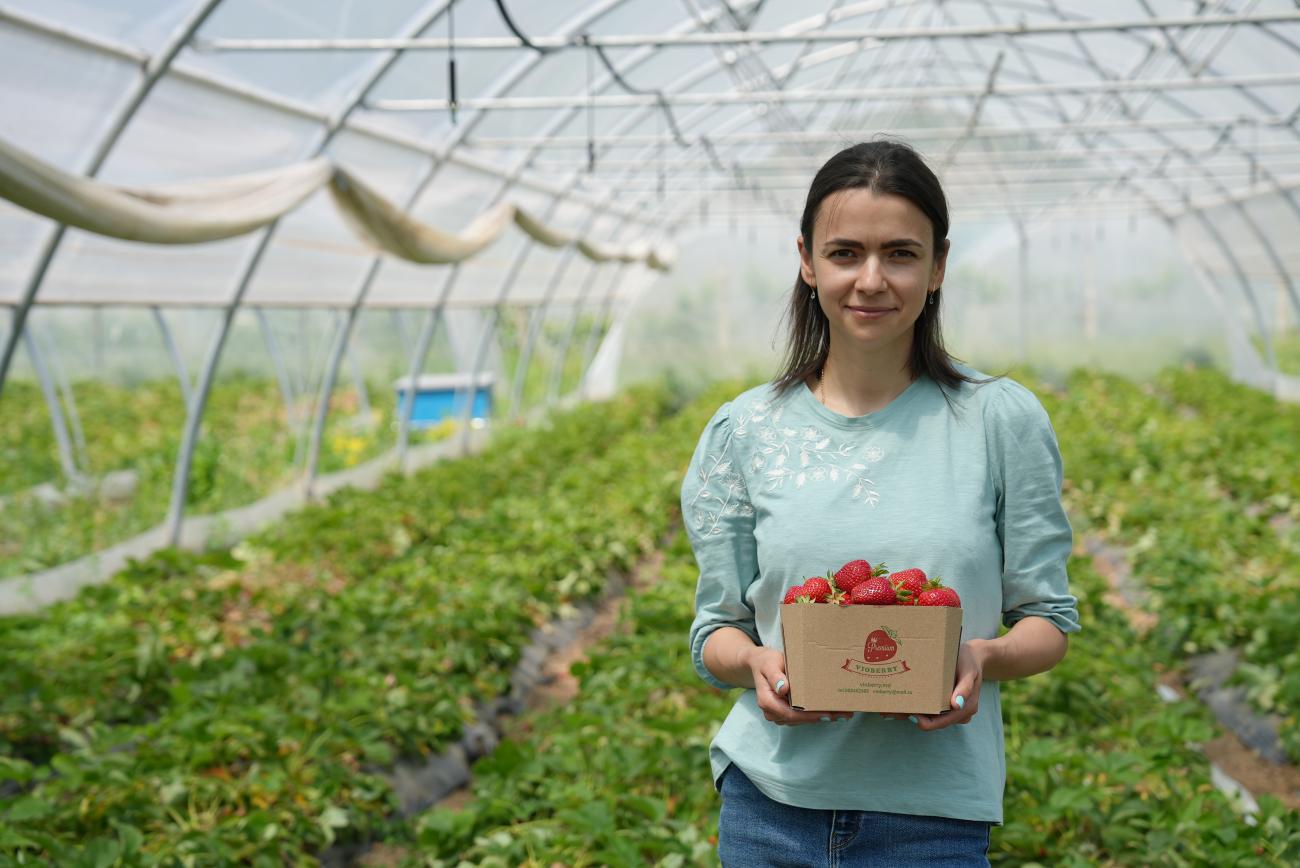Ana Gavriluța turned her strawberry farm into a profitable business

For eight years Ana Gavriluța, from the village of Copanca in the district of Căușeni, has been growing strawberries in an open field.
After inheriting the hobby from her parents-in-law, Ana developed her passion into a profitable business. Working alongside her husband, she has increased the size of her cultivation area from just 5 to over 30 hectares.
Two years ago, Ana wanted to take her business to the next level and decided to look for funding. That's when she found an announcement for the grant competition organised by UNDP under the project “Advanced cross-river capacities for trade (AdTrade)”. Thanks to the grant offered by Sweden and the UK – worth US$15,000 – and the mentoring she got in the UNDP/AdTrade project, Ana has achieved her dream and got results better than she could have imagined. She built two greenhouses of 10 acres each which she equipped with irrigation equipment and mulching film to help warm the soil and control pests.
"If it wasn't for the assistance from Sweden, the UK and UNDP we wouldn't have been able to afford to build these greenhouses. It's a necessity but too expensive for a young family," says Ana Gavriluța.
Building the greenhouses has enabled the Gavriluțas to grow larger harvests in the off-season, regardless of weather conditions. Thus, from the two greenhouses, the entrepreneur harvests up to 400 kg of strawberries daily during the harvest period, which she sells at markets in Chișinău and online.
The entrepreneur says that, by being among the first strawberry sellers on the market, she can sell the produce quickly and at a good price. Her success is also due to the varieties she grows. After several 'experiments' Ana opted for Clery and Marmelad, which are characterised by sweet, large, aromatic and transport-resistant fruit. They beat the competition not only by the quality of the strawberries they grow but also by the convenient packaging used for delivery—biodegradable cardboard boxes.
"On our plantations, we use only organic preparations, we don't use chemicals at any stage. That's why our production is eco-friendly and we confidently recommend it to everyone – even the smallest consumers. For example, after harvesting the strawberries, we plant mustard in the greenhouses, which we then use as a natural fertiliser that improves the quality of the soil and stimulates healthy plant growth."
The entrepreneur also tells her customers about all this, and she always keeps in touch through posts and videos she promotes on social media. "When they see how all the stages of cultivation, care and harvesting are carried out, they have more confidence in the product," says Ana.
Ana learned about marketing strategies in seminars organised with the assistance of the UNDP/AdTrade project. And her business is also doing well thanks to the mentoring she received during the project.
Having built the greenhouses and seen how effective they are, Ana began plans for further expansion. "Don't shrink your dreams just to make them fit reality," she says. Because the market in the Republic of Moldova is small and the competition big, she hopes to reach markets in neighbouring countries, especially Romania, with her sweet, early strawberries.
She believes she will succeed and has two unbeatable strategies. First, by increasing the surface of her cultivation area she will be able to grow more whilst keeping the quality of the product and appreciations of the consumers the same. Her motto is that everyone is responsible for their own health: each of us can choose what we buy and eat. Second, strawberries are often in great demand for their taste and health benefits, being the first fruit to ripen in spring. In order to make her dreams of expansion come true, Ana is already working on a new point in her business plan. She aims to reduce the areas cultivated under the open sky and increase those cultivated with strawberries in protected areas.





